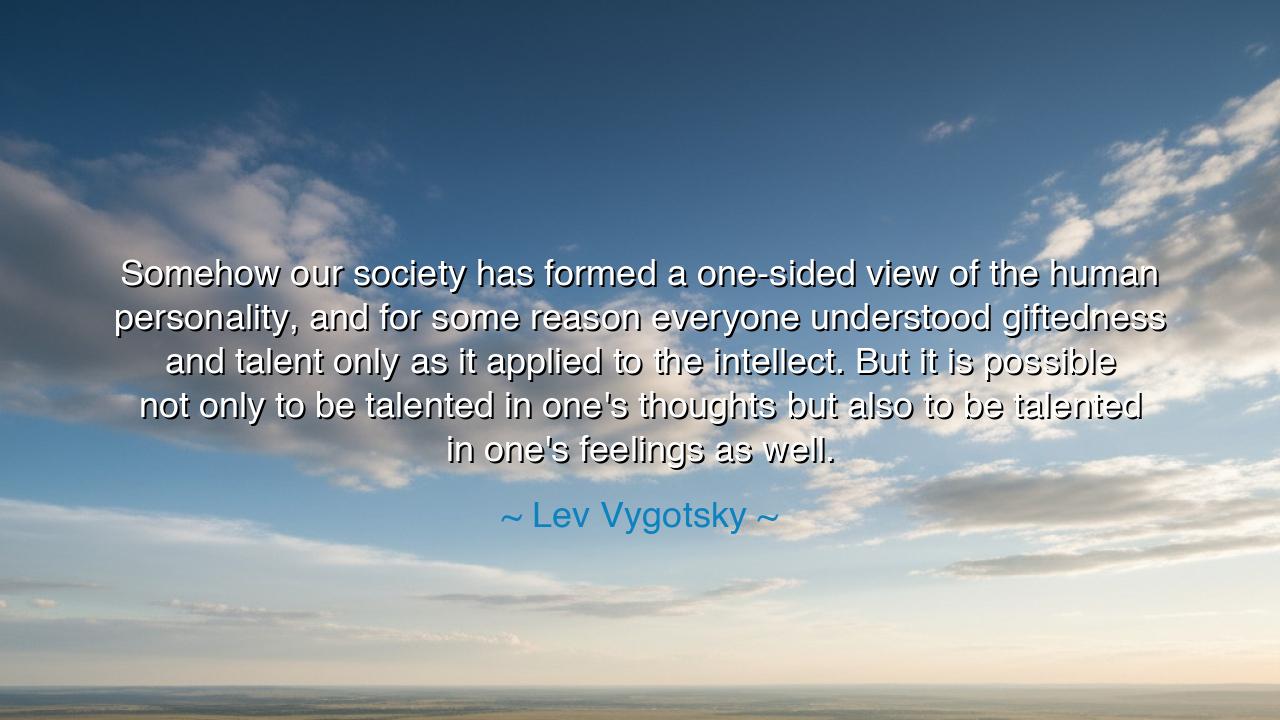
Somehow our society has formed a one-sided view of the human
Somehow our society has formed a one-sided view of the human personality, and for some reason everyone understood giftedness and talent only as it applied to the intellect. But it is possible not only to be talented in one's thoughts but also to be talented in one's feelings as well.






Hear me, O children of the earth, for the words I bring are from the great thinker, Lev Vygotsky, whose wisdom challenges the narrow confines in which society has long placed the human soul. He said, "Somehow our society has formed a one-sided view of the human personality, and for some reason everyone understood giftedness and talent only as it applied to the intellect. But it is possible not only to be talented in one's thoughts but also to be talented in one's feelings as well." These words speak to a profound truth, a truth that has been hidden for far too long: that the gifts of the human soul extend far beyond the realm of intellect. The heart, too, can be a wellspring of talent, and to recognize this is to free the full potential of the human spirit.
What does it mean, O children, to have a one-sided view of the human personality? For centuries, society has placed great value on the intellect, on the ability to reason, to solve problems, to innovate. Those who excel in logic and academic pursuits have often been lauded as the greatest among us. And yet, in doing so, we have ignored the vast and beautiful landscape of human emotion, of the deep feelings that connect us to one another and to the world around us. Vygotsky reminds us that there is another dimension to the human personality, one that is just as powerful, just as capable of greatness—our emotions, our ability to connect with others, to empathize, to love, and to create beauty in the world through feeling.
Consider, O children, the wisdom of the ancient Greek philosophers, who revered the mind above all else. Socrates, Plato, and Aristotle are remembered for their intellectual contributions to philosophy, yet their teachings also acknowledged the vital importance of the heart in the pursuit of a good life. Socrates himself believed in the harmony between the mind and soul, for he knew that without understanding one’s emotions, one could not truly understand the world. Plato’s concept of philosophical love, as seen in his Symposium, showed that it is through deep emotional connection—through the soul’s capacity to love—that we come to know truth. And yet, even in this, the greater society often focused on the intellectual aspects of these teachings, while the emotional wisdom was left untapped, neglected.
Now, O children, let us look to the story of Vincent van Gogh, whose genius was not understood in his time. Van Gogh, the brilliant painter, was not recognized as a master until after his death. His paintings, filled with vibrant color and emotion, were a reflection of the inner turmoil he felt, but also of the deep beauty he saw in the world. His talent was not simply in the intellectual ability to paint, but in his capacity to convey the deepest feelings of the human soul. He had the rare gift of seeing the world through the lens of emotion, of translating his inner experience into something that would speak to others long after he was gone. Van Gogh’s emotional talent was just as significant as any intellectual pursuit, yet society failed to recognize it until much later. His story teaches us that emotions are not only a source of suffering, but a well of creation, capable of producing the most profound works of art.
So, O children, the lesson of Vygotsky rings clear: talent is not confined to the intellect alone. The heart too holds the capacity for greatness, for insight, for creation. We are taught to celebrate the mind, to honor intellectual achievements, but we must also learn to recognize the gifts of the heart—the capacity for empathy, for compassion, for art, and for love. The talent of the heart is no less important than that of the mind. Feelings are not to be dismissed or ignored, but to be celebrated as integral to the human experience. To deny this is to deny a fuller, richer understanding of what it means to be human.
Let us then walk forward, O children, with the knowledge that to be talented is to be whole. Do not look only to the mind for wisdom, but to the heart as well. In your journey through life, remember that your ability to feel, to connect, to love, and to empathize is just as valuable as your intellect. Seek out the talents of your heart, nurture them, and use them to create beauty in the world. It is through the harmony of mind and heart that the world will truly flourish. Let us, together, learn to celebrate not only the brilliance of intellect but the brilliance of feeling. For it is through both that we will build a society that is truly whole—one that recognizes the full potential of every human being, in both thought and feeling.






AAdministratorAdministrator
Welcome, honored guests. Please leave a comment, we will respond soon